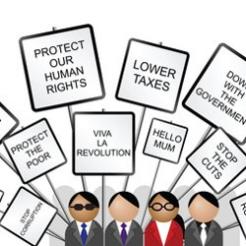The public needs to be educated on the importance of campaigning in the charity sector in light of recent press attacks, the head of programmes at Barrow Cadbury Trust told the sector's independence panel yesterday.
Debbie Pippard said there needs to be more leadership and action on the matter, after the Trust recently came under attack from some corners of the press for its funding to help migrants.
Pippard was giving evidence to the Panel on the Independence of the Voluntary Sector, a group of voluntary sector experts who will produce reports on the factors affecting charities’ independence until 2016.
Pippard warned that there was an increasing hostility in Parliament and other places to the campaigning role of charities. She added that the recent scandals around for-profit groups lobbying Parliamentarians had muddied the waters: “The actions of a few lobbying companies and the campaigning of charities are being seen as one and the same,” she said.
Barrow Cadbury Trust and the Diana Fund have recently been attacked in the Daily Mail and Daily Telegraph for their funding to support migrants in the UK. The Daily Mail has said the Diana Fund had been “cynically hijacked by the Left”, while the Daily Telegraph questions why taxpayers are supporting “pro-immigration” charities.
Pippard said the tone of pieces such as these promoted the ideas that only frontline service-delivery organisations were charitable and illegitimised any campaign working to address structural issues in the society. “The charity sector has a role to play in better explaining why running a soup kitchen is not the same as tackling poverty in a structural way.”
Pippard went on to warn that as well as the articles being of concern, comments from the public in reaction were also worrying: “They were toxic and unpleasant and reveal an increased disillusion with the charity sector.”
Role for the Charity Commision
Pippard suggested that one line of attack to counter this could be a more transparent charity sector. She added that the Charity Commission had a role in being clearer about the campaigning role of charities and said fuller reporting would be helpful.
Last week, the Public Administration Select Committee recommended that charities should be required to publish their expenditure on campaigning and political work in their annual returns, along with how much of their income they receive from public sources.
The recommendations have been heavily criticised by sector leaders. Sir Stephen Bubb, chief executive of Acevo, called it “arrant nonsense” and called for the sector to celebrate its campaigning role. Sir Stephen also wrote a riposte in the Daily Telegraph to its recent concerns on charities’ campaigning. He said: “Any restriction on charities’ right to campaign would represent an assault on the principle of freedom of speech. It would also reduce the level of political representation of many vulnerable and under-represented groups in society."
NCVO has also said it will fight any attacks on the charity sector’s right to campaign.
Ministerial 'glee' at legal aid cuts
Elsewhere, the Panel on the Independence for the Voluntary sector heard evidence from Volunteer Centre Kensington & Chelsea which said it had pulled out of the Work Programme because it restricted the way it worked with its clients. The panel also heard from a representative from Shelter who warned that cuts in legal aid funding from the government was having a “chilling effect” on the voluntary sector’s ability to hold government to account.
Sir Bert Massie, former chair of the Commission for the Compact, said during the hearing that he had personally witnessed a minister's "glee" at an organisation not being able to now claim legal aid: “The implications of this have been thought out in government,” he suggested.
The Panel on the Independence of the Voluntary Sector is chaired by Sir Roger Singleton; other members include Andrew Hind, editor of Charity Finance; Julia Unwin, chief executive of the Joseph Rowntree Foundation and Nicholas Deakin.
The Baring Foundation has committed £99,000 over five years to the work, which will take an “annual snapshot” of the state of the sector’s independence, not just from government but from all stakeholders, such as corporate donors and pressure groups from local communities.









